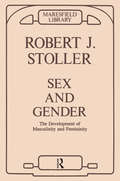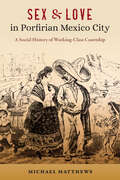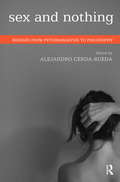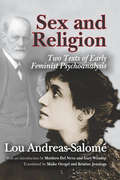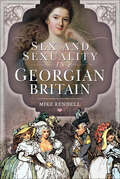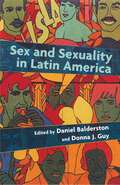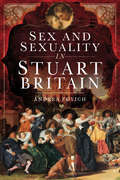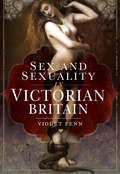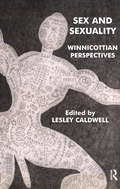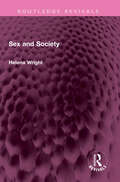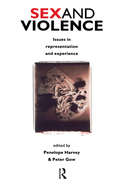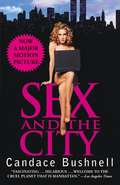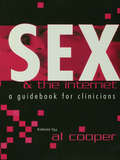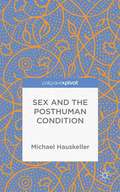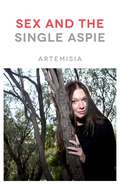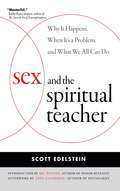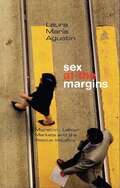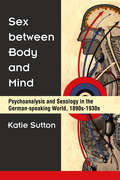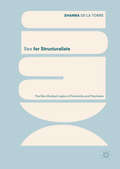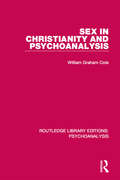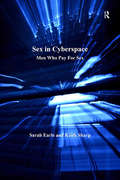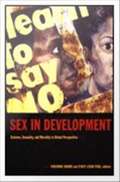- Table View
- List View
Sex and Gender: The Development of Masculinity and Femininity
by Robert J. StollerIn this book, the author describes patients with marked abberrations in their masculinity and feminity--primarily transsexuals, transvestites and patients with marked biological abnormalities of their sex - in order to find clues to gender development in more normal people.
Sex and Gender: The Human Experience (4th edition)
by James A. Doyle Michelle A. PaludiWell-organized and highly readable Sex and Gender: The Human Experience provides a current, multicultural analysis of gender-related issues, theories, and research. The authors' clear presentation of the perspectives and issues related to sex and gender studies enables students to easily comprehend the material. Further, a highly practical approach prompts students to examine their self-awareness and social tolerance. Sex and Gender: The Human Experience is appropriate as a primary or supplementary text in Psychology, Family Studies, or Women's Studies curricula.
Sex and Love in Porfirian Mexico City: A Social History of Working-Class Courtship
by Michael MatthewsExploring the sexual lives of the poor and working class in turn-of-the-century Mexico This social history explores the romantic and sexual lives of the poor and working class in Mexico City during the rule of dictator Porfirio Díaz from 1876 to 1911. By analyzing sexually based crime cases and stories in the penny press, Michael Matthews sheds light on everyday struggles, joys, and desires. Matthews argues that lower-class individuals had more liberated sexual lives than their wealthier counterparts, influenced by the city’s growth and cultural changes. In this book, Matthews examines how Mexico City’s expanding infrastructure, increasing factory work, and new leisure and entertainment activities shaped courtship and sexual practices. He delves into the world of tenement buildings and street life to reconstruct days defined by love and desire, romance and rape, seduction and sex work, and promises kept and broken. Matthews connects the sexual culture of the poor to the changes taking place as the Mexican state modernized and underwent tremendous capitalist growth and development. Sex and Love in Porfirian Mexico City provides insights into how social and economic developments shaped cultural norms surrounding honor, marriage, morality, and parental authority during this period. It will spur new reflections on the possible influence of lower-class culture on modern-day romance and sexual values.
Sex and Nothing: Bridges from Psychoanalysis to Philosophy
by Alejandro Cerda-RuedaFrom its etymological roots, sex is related to a scission, Latin for sectus, secare, meaning "to divide or cut." Therefore, regardless of the various studies applied to defining sex as inscribed by discursive acts, i.e. merely a 'performatively enacted signification,' there is something more to sex than just a social construction or an aprioristic substance. Sex is irreducible to meaning or knowledge. This is why psychoanalysis cannot be formulated as an erotology nor a science of sex (scientia sexualis). In this matter, sex escapes the symbolic restraints of language; however, it is through its failure that it manifests itself through the symbolic, e.g. symptoms or dream life. So, what is sex? Sex and Nothing embarks upon a dialogue between colleagues and friends interested in bridging psychoanalysis and philosophy, linking sex and thought, where what emerges is a greater awareness of the irreducucibility of sex to the discourse of knowledge and meaning: in other words, sex and nothing.
Sex and Religion: Two Texts of Early Feminist Psychoanalysis
by Lou Andreas-SalomeAs a psychoanalyst and author, Lou Andreas-Salome traverses the mystery of sexuality in much of her work. This book, comprised of two texts originally written for adolescents, uniquely explores sexual education and the collision of sexuality and religion across the lifespan.The first piece, "Three Letters to a Young Boy" (1917), is a psychoanalytic fairy tale. The letters offer an interesting version of the evolution of sexual knowledge from childhood through adolescence. The second piece, "The Devil & His Grandmother" (1922), merges sexuality with religion, encapsulating three ages of woman child, to a lost soul and the Devil's bride, to the Devil's Grandmother. Written in charmingly convoluted dialogue, this work has a cinematic, fanciful feel. Both pieces dispense with academic formality and point to a relaxed new phase in Salome's writing life. Interestingly, this tone can also be detected in her blossoming correspondence with Sigmund Freud, which contrasts starkly with her sombre letters to Rainer Maria Rilke.It is with the spirit of free thinking demonstrated in these two selections, perhaps informed by Salome's experimentation with free association, that the reader is transported to a new theatre of Salome's imagination.
Sex and Sexuality in Georgian Britain
by Mike Rendell“A thorough examination of the morals and mindset of Georgian Britons towards sex and sexuality . . . well-written, engaging and educational.” —Caitlyn Lynch, USA Today-bestselling authorPeek beneath the bedsheets of eighteenth- and early nineteenth-century Britain in this affectionate, informative and fascinating look at sex and sexuality during the reigns of Georges I-IV. It examines the prevailing attitudes towards male and female sexual behavior, and the ways in which these attitudes were often determined by those in positions of power and authority. It also explores our ancestors’ ingenious, surprising, bizarre and often entertaining solutions to the challenges associated with maintaining a healthy sex life.Did the people in Georgian Britain live up to their stereotypes when it came to sexual behavior? This book will answer this question, as well as looking at fashion, food, science, art, medicine, magic, literature, love, politics, faith and superstition through a new lens, leaving the reader enlightened and with a new regard for the ingenuity and character of our ancestors.“This book was funny, at times, and for a slim volume is quite comprehensive . . . Good introduction to the period, very easy to read and entertaining.” —Rosie Writes . . .
Sex and Sexuality in Latin America: An Interdisciplinary Reader
by Daniel Balderston Donna GuyDespite the explosion of critical writing on gender and sexuality, relatively little work has focused on Latin America. Sex and Sexuality in Latin America: An Interdisciplinary Readerfills in this gap. Daniel Balderston and Donna J. Guy assert that the study of sexuality in Latin America requires a break with the dominant Anglo-European model of gender. To this end, the essays in the collection focus on the uncertain and contingent nature of sexual identity. Organized around three central themes--control and repression; the politics and culture of resistance; and sexual transgression as affirmation of marginalized identities--this intriguing collection will challenge and inform conceptions of Latin American gender and sexuality. Covering topics ranging from transvestism to the world of tango, and countries as diverse as Mexico, Brazil, and Argentina, this volume takes an accessible, dynamic, and interdisciplinary approach to a highly theoretical topic. "Opens up new conceptual horizons for exploring gender and sexuality. . . . In stimulating readers to think 'outside the box' of established academic notions of sexuality and gender, Sex and Sexuality in Latin America illustrates the sometimes mind-boggling mission of iconoclastic scholarship. The well-written essays are thought-provoking analyses on the cutting edge of gender scholarship."-Latin American Research Review, vol. 36, no. 3, 2001
Sex and Sexuality in Stuart Britain
by Andrea ZuvichAn expert in Stuart England examines the sexual lives of Britons in the seventeenth and early eighteenth centuries in this frank, informative, and revealing history.Acclaimed Stuart historian Andrea Zuvich explores the sexual mores of Stuart Britain, including surprising beliefs, bizarre practices, and ingenious solutions for infertility, impotence, sexually transmitted diseases, and more. Along the way, she reveals much about the prevailing attitudes towards male and female sexual behavior.Zuvich sheds light not only on the saucy love lives of the Royal Stuarts, but also on the dark underbelly of the Stuart era with histories of prostitution, sexual violence, infanticide, and sexual deviance. She looks at everything from what was considered sexually attractive to the penalties for adultery, incest, and fornication.Sex and Sexuality in Stuart Britain touches on the fashion, food, science, art, medicine, magic, literature, love, politics, faith and superstition of the day.
Sex and Sexuality in Victorian Britain
by Violet Fenn&“Dull this book is not, and it gives an insight into the many scandals not spoken about in polite Victorian drawing rooms.&” —Glasgow & West of Scotland Family History Society Peek beneath the bedsheets of nineteenth-century Britain in this affectionate, informative and fascinating look at sex and sexuality during the reign of Queen Victoria. It examines the prevailing attitudes towards male and female sexual behavior, and the ways in which these attitudes were often determined by those in positions of power and authority. It also explores our ancestors&’ ingenious, surprising, bizarre and often entertaining solutions to the challenges associated with maintaining a healthy sex life. Did the people in Victorian times live up to their stereotypes when it came to sexual behavior? This book will answer this question, as well as looking at fashion, food, science, art, medicine, magic, literature, love, politics, faith and superstition through a new lens, leaving the reader uplifted and with a new regard for the ingenuity and character of our great-great-grandparents. &“I would say this book gives you the information on relationships, genders and very much behavior that doesn&’t usually come across in history books. Therefore this is an excellent book indeed, certainly one that more people should be aware of and learn from.&” —UK Historian &“The writing is joyous and it is clear the author enjoys her subject and is fairly knowledgeable on things Victorian.&” —Rosie Writes &“Fenn&’s writing is so readable and it&’s clear this is a book written by a historian who loves her subject and is very knowledgeable about the research being carried out by other historians.&” —Jessticulates
Sex and Sexuality in Victorian Britain
by Violet Fenn&“Dull this book is not, and it gives an insight into the many scandals not spoken about in polite Victorian drawing rooms.&” —Glasgow & West of Scotland Family History Society Peek beneath the bedsheets of nineteenth-century Britain in this affectionate, informative and fascinating look at sex and sexuality during the reign of Queen Victoria. It examines the prevailing attitudes towards male and female sexual behavior, and the ways in which these attitudes were often determined by those in positions of power and authority. It also explores our ancestors&’ ingenious, surprising, bizarre and often entertaining solutions to the challenges associated with maintaining a healthy sex life. Did the people in Victorian times live up to their stereotypes when it came to sexual behavior? This book will answer this question, as well as looking at fashion, food, science, art, medicine, magic, literature, love, politics, faith and superstition through a new lens, leaving the reader uplifted and with a new regard for the ingenuity and character of our great-great-grandparents. &“I would say this book gives you the information on relationships, genders and very much behavior that doesn&’t usually come across in history books. Therefore this is an excellent book indeed, certainly one that more people should be aware of and learn from.&” —UK Historian &“The writing is joyous and it is clear the author enjoys her subject and is fairly knowledgeable on things Victorian.&” —Rosie Writes &“Fenn&’s writing is so readable and it&’s clear this is a book written by a historian who loves her subject and is very knowledgeable about the research being carried out by other historians.&” —Jessticulates
Sex and Sexuality: Winnicottian Perspectives (The\winnicott Studies Monograph Ser.)
by Lesley Caldwell"Winnicott" and "sex" are two subjects that are rarely associated with one another. Sexuality is not a prominent theme within the work of Winnicott, who preferred to concentrate on the development of the self from infancy. However, his writings contain unexplored insights into sexuality and it is these hidden insights that prompted the author to invite papers from leading analysts to expand upon them. This collection provides a fresh and innovative look at the work of Winnicott and into sexuality, in particular infantile sexuality. The unusual link of Winnicott to Freud and to a psychoanalysis located in the drives encourages a different perspective into British psychoanalysis. Other diverse themes include a historical examination of Winnicott through the British Society; an exploration of the similarities between Laplanche and Winnicott; the use of Winnicott's work in the treatment of sexual dysfunction; and the interrelation between sexuality and play. This is the sixth volume in the Winnicott Studies Monograph Series.
Sex and Society (Routledge Revivals)
by Helena WrightFirst published in 1968, Sex and Society presents and analyses the code of sexual behaviour based on the universal use of contraceptive methods. It includes discussion of all forms of sexual activity, and emphasises in particular the attitudes that should be adopted in sex education. Backed up by case histories, and including details of reforms in abortion and homosexual law, this book sheds light on a topic which continues to cause concern in modern times. The author had been in active contact with all kinds of sexual problems for over thirty years in her professional clinic practice, and in her travels in India, Poland and Denmark teaching contraceptive techniques to doctors and nurses. Her experience as a Founder Member of the International Planned Parenthood Federation and participation in all the International and Regional Conferences gave her a very wide knowledge of sexual and social problems throughout the world. This book will be of interest to students of medicine, sexuality studies, psychology, gender studies, and health.
Sex and Violence: The Psychology of Violence and Risk Assessment
by Penelope HarveyProduced in response to the growing international demand for information, this book details the latest research in understanding and controlling violent and sexual offences. Increasing numbers of psychologists are now studying and working with offenders to the advancement of forensic psychology.Chapters cover contributions from ten different countries and are grouped into three sections dealing with risk assessment, sex offenders and offences and violent offenders and offences. The first section discusses the progress that has been made towards making accurate decisions about the risk that an individual poses to the community and emphasises the need to draw on both clinical experience and research.The second section explores understandings and investigations of sexual offences including discussion on: American commitment laws for sexually violent predators; the status of "recovered memories" in criminal trials; factors influencing delays in reporting sexual abuse; a model of rapists' accounts of their offences; and situational factors in sexual offending.The final section on violent offenders and offences includes discussion on: criminal careers; domestic violence; mutiliation-murder in Japan; offender profiling; and sentencing of homicide cases.This book will be of interest to scholars in criminology, psychology and forensic psychiatry and to policy-makers and practitioners who deal with sexual and violent offences.
Sex and the City
by Candace BushnellA columnist's examination of the celebrity affairs and sexual link indulged in by the members of high society is seen through the experiences of a troubled writer, a mega-businessman, a famous underwear model, and others.
Sex and the Internet: A Guide Book for Clinicians
by Al CooperFirst Published in 2002. Routledge is an imprint of Taylor & Francis, an informa company.
Sex and the Posthuman Condition
by Michael HauskellerThis book looks at how sexuality is framed in enhancement scenarios and how descriptions of the resulting posthuman future are informed by mythological, historical and literary paradigms. It examines the glorious sex life we will allegedly enjoy due to greater control of our emotions, improved capacity for pleasure, and availability of sex robots.
Sex and the Single Aspie
by ArtemisiaThis ground-breaking book about sexuality speaks to women on the autism spectrum in fresh new ways, opening doors to discussion, and blowing the lid off taboo subjects. One of the many problems women on the spectrum face is not always understanding how relationships and boundaries work for other people. This book provides answers, plus more that they may not even have thought to ask. Covering one night stands, the importance of safe sex, self-respect, and double standards, there is a wealth of information about the ethics and self-understanding involved in relationships. Written with humour and honesty, this is the go-to guide for sex on the spectrum.
Sex and the Spiritual Teacher
by Scott Edelstein Anne Katherine Mic HunterSex and the Spiritual Teacher looks at the complex of forces that tempt otherwise insightful, compassionate, and well-intentioned teachers to lose their way--and that tempt some of their students to lose their way as well. It analyzes why most of our current efforts to keep spiritual teachers from transgressing usually don't (and in fact can't) work. Perhaps most importantly, it suggests a set of practices and structures that can build community, encourage healthy student-teacher relationships, increase trust and spiritual intimacy between teachers and their students, and help authentic spiritual teachers stay happily monogamous or celibate. Sex and the Spiritual Teacher is for anyone who is or might become part of a spiritual community: students, teachers, clergy, lay leaders, and even casual visitors. It's a reader-friendly, no-nonsense guide to making spiritual life safer and fuller for all of us one person, relationship, and community at a time.
Sex at the Margins
by Laura María AgustinThis groundbreaking book explodes several myths: that selling sex is completely different from any other kind of work; that migrants who sell sex are passive victims; and that the multitude of people out to save them are without self-interest. <p><p> Laura Agustín makes a passionate case against these stereotypes, arguing that the label 'trafficked' does not accurately describe migrants' lives and that the 'rescue industry' disempowers them. Based on extensive research amongst migrants who sell sex and social helpers, Sex at the Margins provides a radically different analysis. Frequently, says Agustín, migrants make rational choices to travel and work in the sex industry. Although they are treated like a marginalised group they form part of the dynamic global economy. <p> Both powerful and controversial, this book is essential reading for all those who want to understand the increasingly important relationship between sex markets, migration and the desire for social justice.
Sex between Body and Mind: Psychoanalysis and Sexology in the German-speaking World, 1890s-1930s (Social History, Popular Culture, And Politics In Germany)
by Katie SuttonIdeas about human sexuality and sexual development changed dramatically across the first half of the 20th century. As scholars such as Magnus Hirschfeld, Iwan Bloch, Albert Moll, and Karen Horney in Berlin and Sigmund Freud, Wilhelm Stekel, and Helene Deutsch in Vienna were recognized as leaders in their fields, the German-speaking world quickly became the international center of medical-scientific sex research—and the birthplace of two new and distinct professional disciplines, sexology and psychoanalysis. This is the first book to closely examine vital encounters among this era’s German-speaking researchers across their emerging professional and disciplinary boundaries. Although psychoanalysis was often considered part of a broader “sexual science,” sexologists increasingly distanced themselves from its mysterious concepts and clinical methods. Instead, they turned to more pragmatic, interventionist therapies—in particular, to the burgeoning field of hormone research, which they saw as crucial to establishing their own professional relevance. As sexology and psychoanalysis diverged, heated debates arose around concerns such as the sexual life of the child, the origins and treatment of homosexuality and transgender phenomena, and female frigidity. This new story of the emergence of two separate approaches to the study of sex demonstrates that the distinctions between them were always part of a dialogic and competitive process. It fundamentally revises our understanding of the production of modern sexual subjects.
Sex for Structuralists: The Non-Oedipal Logics of Femininity and Psychosis
by Shanna de la TorreThis book argues that structuralism makes itself useful when it engages with the non-Oedipal logics of femininity and psychosis. Building from the psychoanalytic belief that norms repress unconscious desire while structures open onto the creative resources of the symbolic, Sex for Structuralists looks to key texts in myth, trauma, and unconscious fantasy by Sigmund Freud, Jacques Lacan, and Claude Lévi-Strauss. It also examines innovative writings by contemporary Lacanian thinkers in order to discover what becomes of structuralism when the ground upon which it ostensibly stands (namely, that of the zero symbol or the incest prohibition) drops out from under it.
Sex in Christianity and Psychoanalysis (Routledge Library Editions: Psychoanalysis #6)
by William Graham ColeOriginally published in 1956, this survey of the interpretations of sex by the major figures in Christian thought and in psychoanalysis made an important contribution to the re-thinking of our sexual morality at the time. The author refutes the common belief that the negative attitude toward sex and the body, which had been predominant in western civilization, originated with Christianity. He shows that such a viewpoint was widespread in the early Hellenism Age, nearly three centuries before Christ. He emphasizes the essentially positive view which Biblical religion demands and shows how Christianity’s attitude early became corrupted by the dualism of the Orient. He points to the need for a return to essential naturalism and the Biblical interpretation of sex. The first part of the book consists of a historical treatment in the Christian tradition, touching upon the teaching of Jesus, Paul, Augustine, Aquinas, Luther, Calvin and others. He analyses the classical and contemporary attitudes and ideas in both Catholic and Protestant circles and shows how Christian understanding comes into conflict with psychoanalysis. In the later portions of the book the author discusses sex and psychoanalysis and the major problems in sexual mores. He ends with a synthesis of the religious and psychoanalytic points of view and a critical reconstruction of a Christian interpretation.
Sex in Cyberspace: Men Who Pay For Sex
by Sarah Earle Keith SharpSex in Cyberspace offers a bold and provocative, yet sensitively written, account of an under-investigated area of sociological enquiry. While there is a considerable amount of research documenting the experiences of sex workers, very little data exists on their male clientele. The first empirically-based volume on the experiences of men who pay for sex, this work presents a significant new source of data. The book is based upon an extensive study of on-line forums in which both the purchasers of sexual services and the workers themselves can exchange information and views - information which is otherwise extremely difficult to obtain. Sarah Earle and Keith Sharp argue that such sites represent a significant change in the social organization of sex work and those who seek and use the services of sex workers. Shedding new light on men's sexual identity, Sex in Cyberspace makes a major contribution to the study of sexuality.
Sex in Development: Science, Sexuality, and Morality in Global Perspective
by Vincanne Adams Stacy Leigh PiggSex in Development examines how development projects around the world intended to promote population management, disease prevention, and maternal and child health intentionally and unintentionally shape ideas about what constitutes "normal" sexual practices and identities. From sex education in Uganda to aids prevention in India to family planning in Greece, various sites of development work related to sex, sexuality, and reproduction are examined in the rich, ethnographically grounded essays in this volume. These essays demonstrate that ideas related to morality are repeatedly enacted in ostensibly value-neutral efforts to put into practice a "global" agenda reflecting the latest medical science. Sex in Development combines the cultural analysis of sexuality, critiques of global development, and science and technology studies. Whether considering the resistance encountered by representatives of an American pharmaceutical company attempting to teach Russian doctors a "value free" way to offer patients birth control or the tension between Tibetan Buddhist ideas of fertility and the modernization schemes of the Chinese government, these essays show that attempts to make sex a universal moral object to be managed and controlled leave a host of moral ambiguities in their wake as they are engaged, resisted, and reinvented in different ways throughout the world. Contributors. Vincanne Adams, Leslie Butt, Lawrence Cohen, Heather Dell, Vinh-Kim Nguyen, Shanti Parikh, Heather Paxson, Stacy Leigh Pigg, Michele Rivkin-Fish
Sex in Peace Operations
by Gabrielle SimmGabrielle Simm's critical re-evaluation of sex between international personnel and local people examines the zero-tolerance policy on sexual exploitation and abuse and its international legal framework. Whereas most preceding studies of the issue have focused exclusively on military peacekeepers, Sex in Peace Operations also covers the private military contractors and humanitarian NGO workers who play increasingly important roles in peace operations. Informed by socio-legal studies, Simm uses three case studies (Bosnia, West Africa and the Democratic Republic of the Congo) to illustrate the extent of the problem and demonstrate that the problems of impunity for sexual crimes are not just a failure of political will but the result of the structural weaknesses of international law in addressing non-state actors. Combining the insights of feminist critique with a regulatory approach to international law, her conclusions will interest scholars of international law, peace and conflict studies, gender and sexuality, and development.
